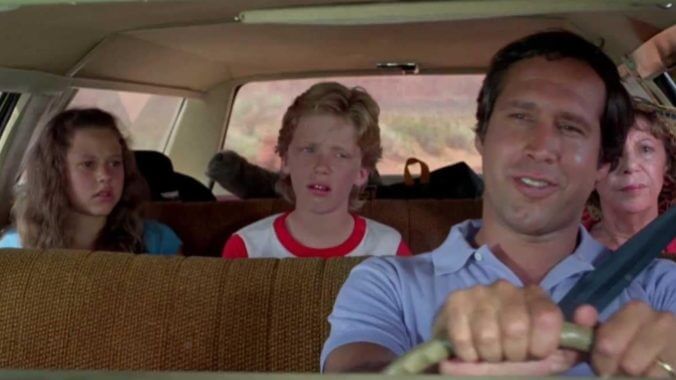40 Years Later, National Lampoon’s Vacation Is Fun But Badly Defanged Suburban Satire

When I was a kid, I had no idea that Saturday Night Live co-stars Chevy Chase and Bill Murray had a long-standing, simmering feud, one that even exploded into fisticuffs(!) backstage. Yet when it came to choosing between the two, mine was always a Murray household, especially in the early 2000s when the star was making melancholy indies like Lost in Translation and Broken Flowers. Oh, Chase was funny, don’t get me wrong—I always laughed at “I’m Chevy Chase and you’re not,” and his smartassery in Caddyshack was unparalleled (even if Murray’s sublime stupidity there still overshadowed him). But where Murray was truly content to be in on the joke, smirking at authority figures but never patronizing the audience, Chase always felt smug and above his own material. He’d raise an eyebrow at the buffoonery in Fletch and Spies Like Us, certain he was better than this.
When National Lampoon’s Vacation, directed by Harold Ramis, was released in 1983, America ultimately voted with their dollars for Chase’s ascendance as a movie star. The movie made $61 million worldwide ($188 million adjusted for inflation) and spawned several sequels, including Christmas Vacation, European Vacation, and the misbegotten 2015 reboot Vacation. Forty years later, it’s strange to think about a comedy this darkly funny creating a successful franchise in an age dominated by bigger blockbusters. It’d be easy for any film fans reading this to now consider and mourn the demise of the studio comedy. However, Vacation exemplifies the best and worst aspects of the National Lampoon school of laughs, as well as why Chevy Chase never understood his own stardom.
The movie centers on food additive executive Clark Griswold (Chase), his wife Ellen (Beverly D’Angelo), son Russell a.k.a. Rusty (Anthony Michael Hall), and daughter Audrey (Dana Barron), a nuclear family about to take a road trip to the thinly disguised Disney analogue Walley World. How excited are they for this trip to “America’s Favorite Family Fun Park”? The foursome sing the entire theme song for the main mascot, Marty Moose. Clark somehow has the entire route mapped out on his video game set. When things go wrong, he ties his wife’s Aunt Edna’s (Imogene Coca) dead body to the top of the infamous Wagon Queen Family Truckster. And when things really go wrong, he pulls what looks like a gun on a security guard to get the park up and running.
For a film featuring two fun, poppy Lindsay Buckingham songs on the soundtrack, including hit “Holiday Road,” Vacation’s depiction of the family trip from hell is often shockingly, hilariously dark. The Griswolds have fun at first, but as they run out of money and repeatedly get lost or crash the wagon, their true colors start to show.
-

-

-

-

-

-

-

-

-

-

-

-

-

-

-

-

-

-

-

-

-

-

-

-

-

-

-

-

-

-

-

-

-

-

-

-

-

-

-

-








































